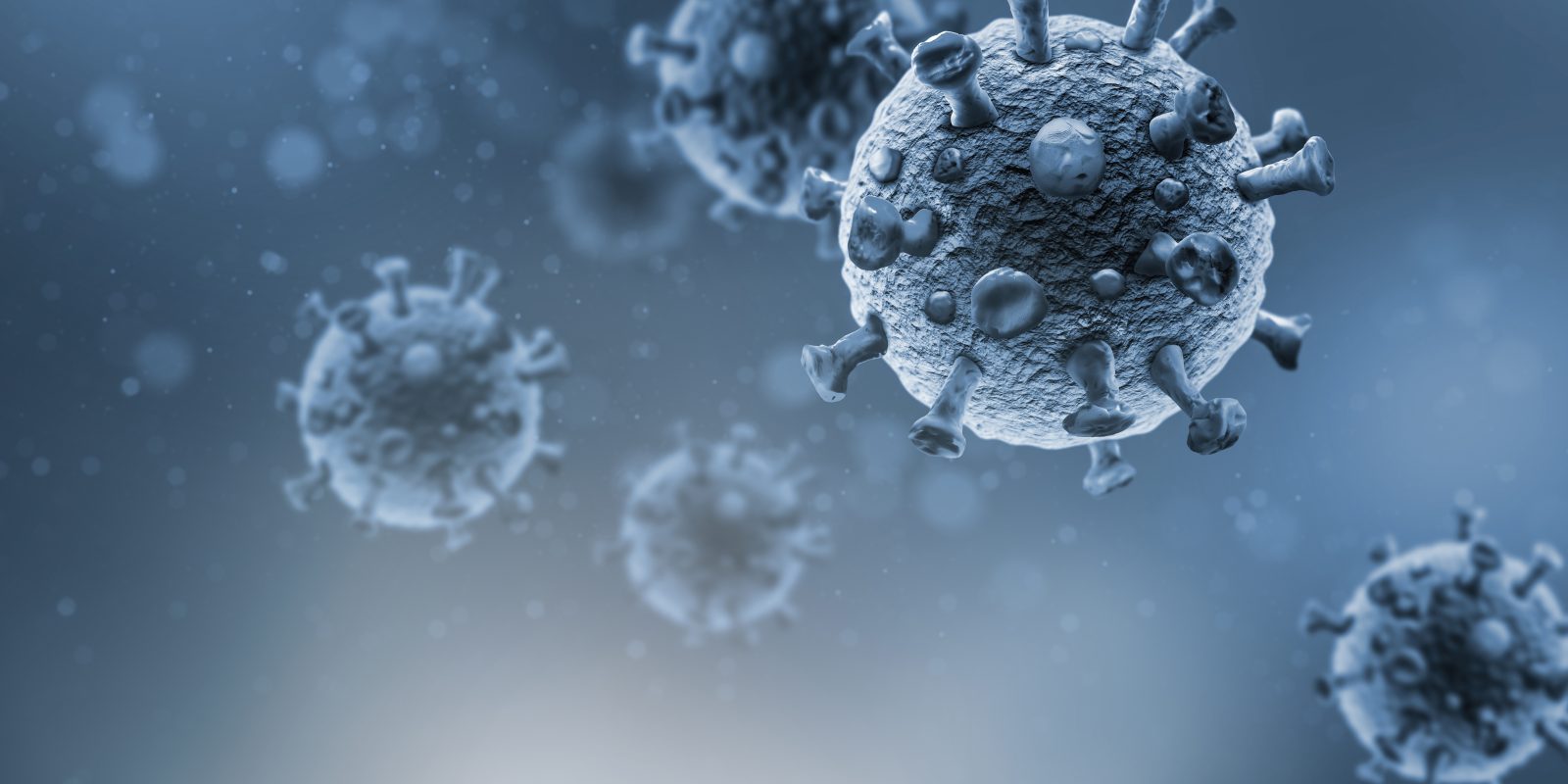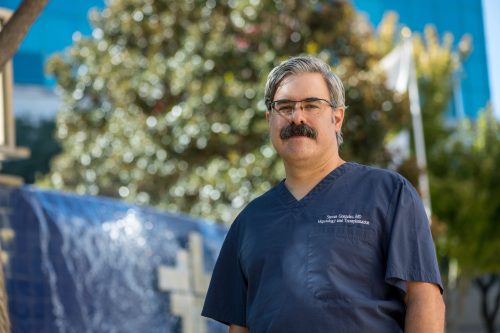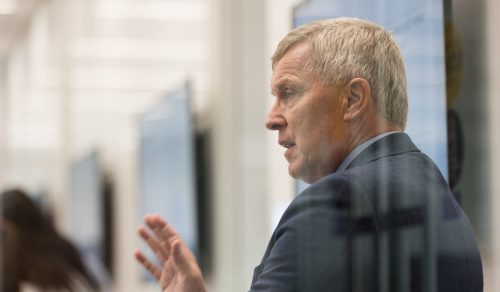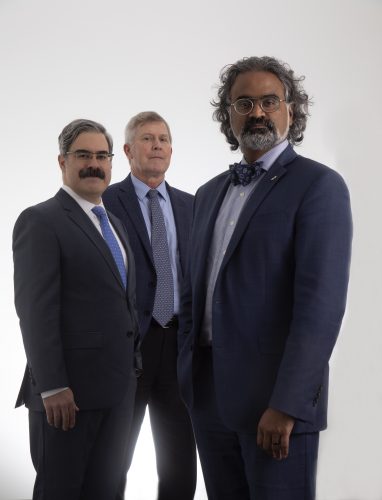
A Weapon Against Covid
An existing anti-rejection drug could combat life-threatening inflammation in Covid patients.
In January 2021, Jeff Walburn met with a contractor about renovations on his house. Having undergone a successful liver transplant 13 years prior, he was taking extra precautions to guard against the coronavirus: meeting outside, social distancing and limiting contact with surfaces.
Three days later, the contractor called to say he had tested positive for Covid-19. The following day, chest pressure and fatigue sent the 58-year-old Walburn of Weatherford, Texas, to urgent care. Doctors there gave him a Covid test and, after consulting with his transplant team, prescribed treatment.
The next day, the test confirmed he had contracted the virus.

Dr. Stevan Gonzalez, an associate professor at the TCU School of Medicine, is medical director of liver transplantation at the Annette C. and Harold C. Simmons Transplant Institute. Photo by Leo Wesson
Walburn said his transplant physician, Dr. Stevan Gonzalez, later told him his goal had been to keep his patients out of the hospital because they might end up on a ventilator.
Over the next 10 days, more symptoms followed, including a miserable cough and loss of taste and smell. “The headaches were also excruciating,” Walburn said. “I could hardly sleep because of the headaches. They were so severe.”
Inside Walburn’s body, a cytokine storm was likely erupting. His immune system, in attacking the virus, had turned from friend to foe by generating a toxic number of cytokine proteins. As those immunity-enhancing chemicals flooded his body, they were interfering with its regular functions.
In many cases, those storms end up destroying heart and lung tissue and ultimately lead to death.
Walburn eventually recovered. For others battling Covid, an existing monoclonal antibody — given to kidney transplant patients to safeguard the new organ — could potentially stop the immune system’s overreaction and save lives.
The Fort Worth Clinical Sciences Working Group, made up of 15 North Texas physicians, has received approval from the U.S. Food and Drug Administration to conduct trials and test the drug in Fort Worth-area hospitals.
The drug they will test is basiliximab, a transplant rejection drug commonly known as Simulect. Results will show whether it can reduce inflammation caused by that cytokine storm in patients with the most severe cases of Covid-19.
Immune Malfunction
In the early stages of the pandemic, medical professionals did not know what caused the novel coronavirus to turn fatal. While researchers across the world worked at a lightning pace to develop Covid vaccines, others eyed existing drug treatments to mitigate infections.
Covid patients “would rapidly go into respiratory failure, and their bodies would go into a state of shock. They would require an increase in oxygen support to their lungs and ultimately end up on life support.”
Stevan Gonzalez
Gonzalez, associate professor at the TCU School of Medicine, spent countless days and nights treating people in the intensive care unit of Baylor Scott & White All Saints Medical Center-Fort Worth, where he serves as medical director of liver transplantation at the Annette C. and Harold C. Simmons Transplant Institute.
Even when critically ill Covid patients received the most aggressive form of medical care he had to offer, their health often declined in a hurry, Gonzalez said. “They would rapidly go into respiratory failure, and their bodies would go into a state of shock. They would require an increase in oxygen support to their lungs and ultimately end up on life support.”
By March 2020, the world’s medical community had figured out that uncontrolled development of cytokines, proteins secreted by the immune system, were often the cause of Covid’s fatal turn.
“We had observed this kind of reaction to viral infections in the past,” Gonzalez said, “and looking at what was coming out in the cutting-edge research of Covid-19, we were understanding that the immune system had a major role in creating this reaction.”
Cytokines are the body’s natural immune response to a viral infection, said Dr. Stuart D. Flynn, the founding dean of the TCU School of Medicine. “When they [cytokines] work correctly, they are working every day for us clearing organisms out of our body, and we never know it.”
But the Covid-19 virus is a deadly stranger to the human body. Once infected, the body tries to create an appropriate immune response using those typically helpful cytokines to eliminate the virus. As the infection accelerates, that once reliable immune response turns into a bigger problem than the virus.
“The cytokine storm is this horrible state that leads to unchecked and unregulated inflammation,” said Dr. Mohanakrishnan Sathyamoorthy, a professor and the department chair of internal medicine at the TCU School of Medicine, who was looking at existing drug treatments that could neutralize the reaction. “In some patients, there is a dysregulation of intensity of this inflammatory response, and the result is you actually end up damaging your own tissue.”
Seeing Hope
Gonzalez, Flynn and Sathyamoorthy joined forces to launch a research group in hopes of curtailing the lethal immune response.
“I realized that this couldn’t be a solo project; this is a medical school level effort,” said Sathyamoorthy, who is also medical director of Baylor Scott & White’s Fort Worth Heart and Vascular Hospital. “The best way to think about how we can serve our community, science and medicine at large would be to create a working group.”
Sathyamoorthy recruited Flynn and Gonzalez to start, then enlisted faculty and physicians across Dallas-Fort Worth to participate.

Dr. Stuart D. Flynn is the founding dean of the TCU School of Medicine. “We’ve set up this environment to build a much bigger attraction to [the medical] industry to want to come in here and do their clinical trials,” he said. “That is the ultimate goal.” Photo by Leo Wesson
By April 2020, the research group consisted of 15 physicians in leadership roles at major North Texas health organizations, including Baylor Scott & White, Texas Health Harris Methodist Hospital, JPS Health Network, Cook Children’s Medical Center and the medical school. The physicians represent a range of medical specialties, including infectious diseases, transplant immunology, cardiovascular medicine, pulmonary critical care medicine, pediatric critical care medicine, and pediatric oncology and immunology.
By mid-August 2020, as new daily Covid diagnoses in the U.S. hovered around 60,000, the group had developed multiple study proposals in hopes of lessening the pandemic’s devastation.
The first studied how a cytokine storm manifests inside the body and evaluated available medicines that might also treat the inflammation caused by a cytokine storm.
That search led them to basiliximab.
In 1998, the FDA approved basiliximab for treatment of kidney transplant patients. The monoclonal antibody, a type of synthetic molecule that mimics a natural protein, can inhibit the body’s immune response and keep it from rejecting a new kidney.

Dr. Mohanakrishnan Sathyamoorthy is the department chair of internal medicine at the TCU School of Medicine. He enlisted 15 North Texas physicians to join a working group dedicated to halting immune system overreaction in Covid patients. Photo by Leo Wesson
Basiliximab can also calm down the specific cytokine that attacks a viral intruder. The researchers submitted an Investigational New Drug (IND) application to the FDA seeking approval to test the proven anti-rejection drug on Covid patients.
In fall 2021, after almost a year of back and forth with the agency to complete rigorous revisions, the FDA granted approval to conduct trials with basiliximab. The physicians immediately strategized about how to enroll 300 patients in the Dallas-Fort Worth area.
Covid-19 patients at Texas Health Harris Methodist Hospital Fort Worth, Baylor Scott & White All Saints Medical Center-Fort Worth and John Peter Smith Hospital could take part.
IND applications are almost always sought by and granted to pharmaceutical or medical device corporations, so for a small physician working group to receive such approval without any funding is a positive development for the medical school and TCU, Sathyamoorthy said. “To get the trial underway and enroll the number of patients needed, we need significant financial support. Raising money to complete the job is the next great challenge in this journey, and one we can do together here in Fort Worth.”
Another key proposal was to establish a biorepository to store all the fragile research specimens. Floyd Wormley Jr., associate provost for research and graduate studies at TCU, volunteered freezers in the university’s research labs.
Any future medical researcher who wants to replicate or build on the basiliximab study will need to retrieve the tissues stored on the TCU campus.
“Everyone here has had an open-door policy and wanted to help,” Flynn said. “Everyone is excited. This is cool stuff for Fort Worth.”
Healing Steps
The timing of the research is a boon for the newest students at the TCU School of Medicine. They studied cytokines in fall 2021, and some of the students are assisting with the research efforts.
“They will get the basic information of how these cytokines work, which is a beautiful thing,” Flynn said. “This whole issue of cytokines, cytokine storms and clotting — they are all intimately related.”
Walburn, already a believer in the power of anti-rejection drugs, said the research could be a game changer in battling Covid.

Dr. Stevan Gonzalez, Dr. Stuart D. Flynn and Dr. Mohanakrishnan Sathyamoorthy joined forces to launch a research group in hopes of curtailing a lethal immune response to Covid-19. Photo by Joyce Marshall
“I didn’t do anything without consulting Dr. Gonzalez. I trust him explicitly,” Walburn said. “If it wasn’t for his guidance [on treating the virus], I probably would’ve been in a hospital on a ventilator. I’m a strong advocate for anything that would lessen the symptoms of that monster because it is bad news and it’s rough.”
The road back to full health after contracting the virus and surviving the storm has been a long one for Walburn, as the effects have lingered for months.
“There’s times that my wife is cooking dinner and I can’t smell it,” he said. “The taste of things didn’t come back until about August.”
Walburn also had to rebuild his capacity for exercise since battling the virus. After the liver transplant, he used to train for up to 15 hours a week and had completed three half-Ironman events and the six-day, 350-mile Lone Star Circle of Life bike ride.
Even simple walks became a daunting task while he recovered from Covid.
If he took a short walk, he said, “My chest was hurting and I was short of breath. I didn’t realize it was going to be as hard as it was.”
But thanks to the marvel of modern medicine, he has a full recovery in sight, has received his vaccinations and is training to participate in a full Ironman event. After that? “I think I’ll summit Mount Kilimanjaro or Denali.”

Your comments are welcome
Comments
Related reading:
Alumni, Research + Discovery
Covid-19, Anxiety and Death
Surviving Covid-19 and learning to manage her anxiety changed Sarah Angle’s sense of self.
Alumni, Features
Barclay Berdan Leads the Covid Vaccination Effort in DFW
The Texas Health Resources CEO is a case study in crisis leadership.
Research + Discovery
Floyd Wormley Jr. Leads Research and Graduate Studies
The associate provost, dean and professor works to perfect the teacher-scholar model and help faculty learn to market their research.